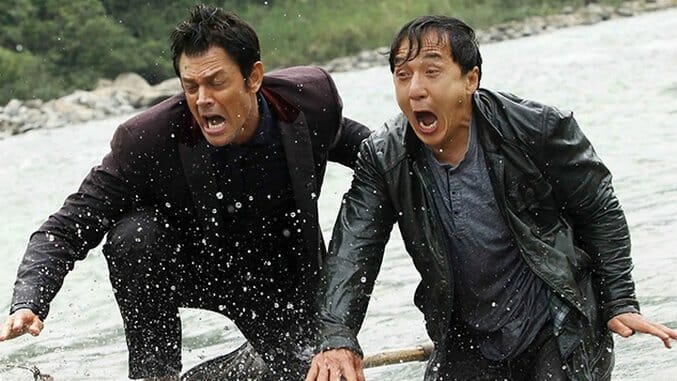Skiptrace

A Hong Kong cop, played by Jackie Chan, and a fast-talking American begrudgingly team up on a mission to bring down a large-scale criminal enterprise, all while bickering and trying to get along with each other. That’s the basic plot outline of the new action comedy Skiptrace, and…yes, it does sound a lot like Chan’s major international breakthrough from 1998, Rush Hour, with Johnny Knoxville taking up the Chris Tucker mantle. Alas, within that familiar set-up, director Renny Harlin and screenwriters Jay Longino and BenDavid Grabinski seem mostly content to color the formula with the most clichéd of plot elements: an obsessive quest for revenge, a loose-living American trying to help break the Asian out of his hard-ass shell, a clash between amorality and a code of honor. There’s not much in Skiptrace you haven’t seen before, and Harlin seems to realize this, infusing the film with a generally carefree attitude toward even the most dramatic and/or emotional of situations.
About two-thirds of the way, through, however—as Bennie Chan (Chan) and Connor Watts (Knoxville) are walking through a pasture in China, briefly discussing Bennie’s future plans—Watts says to Bennie, “You know, you’re no spring chicken anymore.” Suddenly, with one line, Skiptrace acquires a faint air of autumnal melancholy. Jackie Chan is now 62, and even though age has clearly slowed him down from the dizzying heights of physicality he brought to his Hong Kong films in the 1980s and ’90s, Skiptrace demonstrates he at least still has that self-effacing quality that made him as likable a screen presence as he was an astonishing performer.
Though the action choreography in the film—masterminded by Wu Gang, a frequent stunt performer for Chan in recent years—doesn’t demand quite as much out of its star as he often demanded of himself in the Police Story films, he throws himself into it all with entertaining abandon. Even a potentially embarrassing non-action scene in which a drunken Bennie suddenly breaks out into a rendition of Adele’s “Rolling in the Deep,” inspiring the rest of a Mongolian tribe to sing along, is at least partially redeemed by the actor’s sheer charm. He doesn’t take himself too seriously.
-

-

-

-

-

-

-

-

-

-

-

-

-

-

-

-

-

-

-

-

-

-

-

-

-

-

-

-

-

-

-

-

-

-

-

-

-

-

-

-








































